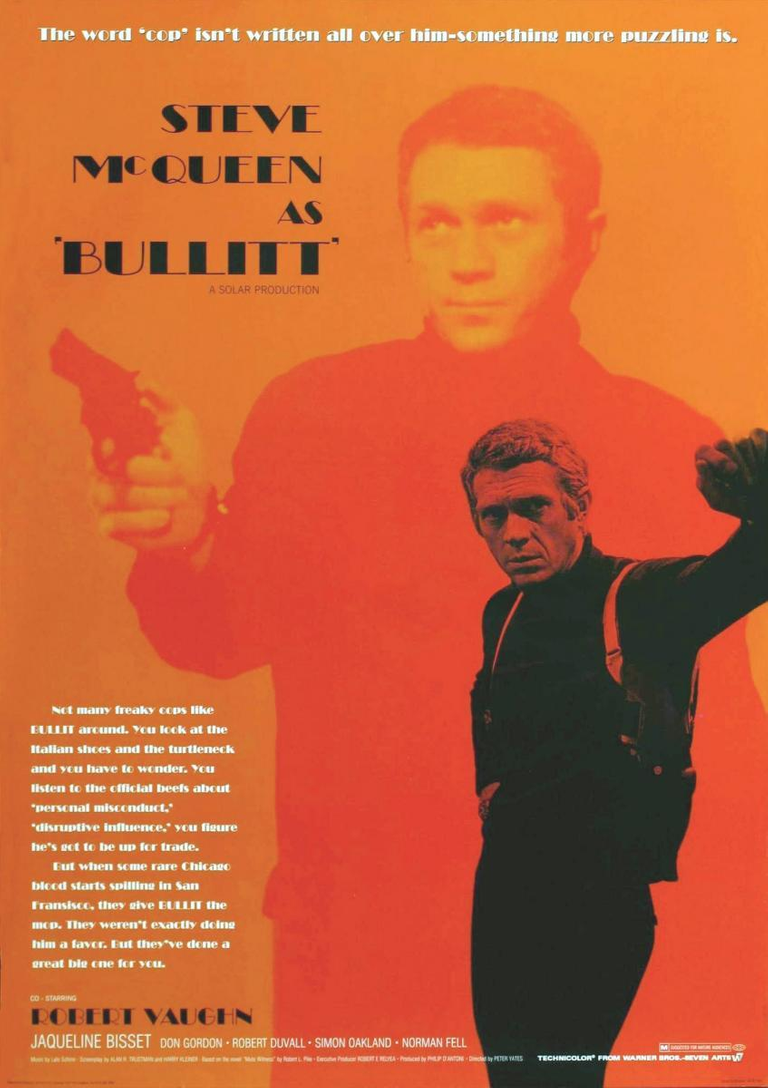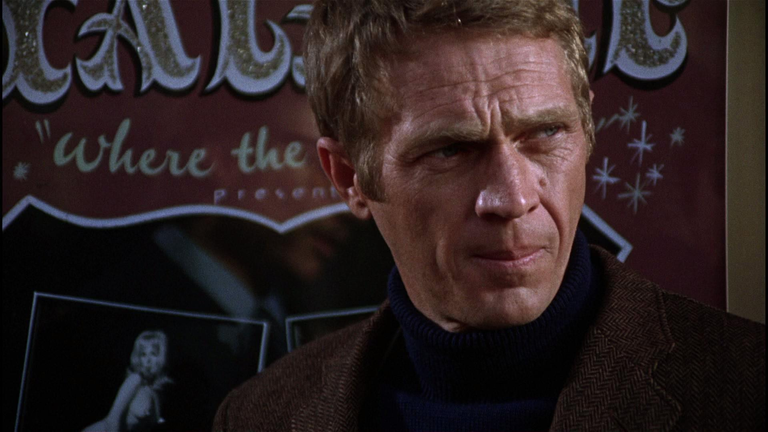Movie Review: Bullitt (1968)
McQueen carries the film on his shoulder in front of and behind the cameras, not only is he the protagonist, but his production company (Solar) was involved in the project from minute one. The superb cast of secondary players covers his back in every moment.

Source: filmaffinity.com/us/filmimages.php?movie_id=321480
DATA SHEET
Title: Bullitt
Year: 1968
Duration: 113 min.
Country: United States
Directed by: Peter Yates
With: Steve McQueen, Robert Vaughn, Jacqueline Bisset, Simon Oakland, Don Gordon, Norman Fell, Robert Duvall, Felice Orlandi.
The story requires a bit of attention from the viewer, but it is told without too many twists and turns and is easy to follow. Despite the fact that it has the most famous car chase in movie history, Bullitt is not a movie that requires leaving your brain in the wardrobe, quite the opposite: whoever pays a little attention and does not suffer from mental laziness can reason in based on the facts on the screen and reach the same conclusions as the protagonist.
What makes it my favorite is the balance between the seriousness with which they show police work and the entertainment that the story provides. There is no comic relief clown character here, but neither is there a climate of constant bitterness: Frank Bullitt (Steve McQueen) frowns as he collects the clues in the case and confronts those who pressure him for political reasons, but outside of work hours he entertains himself and has a good time having dinner with his girlfriend and friends. He gets along well with his coworkers and his immediate boss, Captain Bennett (Simon Oakland) is confident in his ability to solve cases.

Source: pics.filmaffinity.com/Bullitt-291614675-large.jpg
It's Saturday and Senator Walter Chalmers (Robert Vaughn) entrusts the San Francisco Police Department with custody of a witness over the weekend: Johnny Ross must testify before an anti-mafia commission next Monday. Bullitt reluctantly accepts the mission and takes turns with his colleagues Delghetti (Don Gordon) and Stanton (Carl Reindel) to protect Ross, who is staying at a cheap hotel. During Stanton's shift, Ross unbolts the door and a pair of assassins burst into the room. One of them carries a sawed-off shotgun, with which he wounds Stanton and fires at Ross.
Ross and Stanton are taken to the hospital. As he is being loaded into the ambulance, Stanton describes the killers and tells Bullitt that Ross opened the door for them. Bullitt goes to the hospital to make sure Stanton is okay and to find out about the health of Ross, who dies of his injuries. However, he agrees with Dr. Willard (Georg Stanford Brown), Ross's ER doctor, not to report his death yet. Meanwhile, Chalmers shows up at the hospital demanding explanations. Bullitt ignores him and with the help of Willard and Delghetti takes the body to the police morgue, but not with the name of Ross but as a "John Doe", that is, an unknown person.
From then on, Bullitt begins his investigation, against the clock, under constant pressure from Chalmers who in turn puts pressure on his boss, and his boss's boss and in the crosshairs of the assassins, who follow him to find out the whereabouts of Ross and finish the job. It doesn't matter, he's still on his own, gathering information and seeing what's out of place. A taxi driver (Robert Duvall) tells him that, on the way to the hotel, Ross stopped to make a couple of calls. This information leads Bullitt to the discovery of a second corpse in a hotel in San Mateo, and he is getting closer to the truth.
Bullitt works efficiently and without wasting time, without getting carried away by pressure or threats. As we have already said, his boss trusts him. It is so that Bennet leaves the case in his hands and tells him to do what he sees fit. He even tries to make things easier for him, but ultimately it is Bullitt who has to face Captain Baker (Norman Fell) and Chalmers himself. But he doesn't whine, he doesn't brag, he doesn't shout, he just concentrates on his work, although yes, he doesn't let himself go over, which would possibly put him today on the list of examples of "toxic masculinity".
Couldn't be farther from the truth. As we have already seen, Bullitt is neither weak nor submissive, and yet he listens to the arguments of his girlfriend Cathy (Jacqueline Bissett), who loves him but at times questions the very nature of Frank's work. "You live in a sewer," he tells him, after having seen the body of the second victim. Beyond these these disagreements, the couple gets along more than well and it's in the scenes with Cathy that we see Frank's happier and more carefree side.
The producers sought to give the feeling of realism and tried to avoid using the same sets that were common to films of the genre at the time, and instead filmed in real locations, such as the San Francisco International Airport or the Kennedy Hotel. For the same reason, they strictly adhered to the police procedures of the time. Yet today, after watching countless episodes of CSI and the like, you see the scene where Bullitt and Delghetti go through the luggage for clues and you can't help but think: what was it going?? put some latex gloves. Well, in reality, there were no smart phones or computers either: there is a crucial scene in the film involves the transmission of documents by telex, which, with 1968 technology, seems to take ages.
As I said, what people usually remember today is the car chase, the duel between the protagonist's Ford Mustang GT Fastback and the bad guys' V-8 Dodge Charger, which required three weeks of filming for a total of ten minutes on screen, and was filmed by Yates himself instead of the second unit director. Despite containing numerous continuity errors, it earned the editor (Frank Keller) an Oscar and is still considered one of the best of all time today. In total, four vehicles were used: two Mustangs and two Chargers, all with suspension modifications so they could withstand the bumps in the chase. The driver of the Charger was Bill Hickman, a veteran stuntman who also plays one of the murderers; the Mustang was piloted in some takes by Steve McQueen and in others by Bud Ekins, who had also driven it in the motorcycle jump in The Great Escape (1960).
The film grossed $42.3 million, a little over 10 times its original budget. The exquisite soundtrack is in charge of Lalo Schifrin, the Argentine who was also composed the theme of Mission: Impossible. At the time, Bullitt had a major cultural impact; even the type of clothing McQueen wore in the film became highly sought after in stores. And of course, the Mustang GT Fastback became Ford's best-selling model.
And that's all for today, folks :). Like I said, in this post I wanted to share with you one of my favorite movies of all time. I hope you liked it and perhaps it made you want to take a look at it. Bullitt is a film that admits to seeing it again more than once, savoring it like a good wine whose flavor improves over the years.